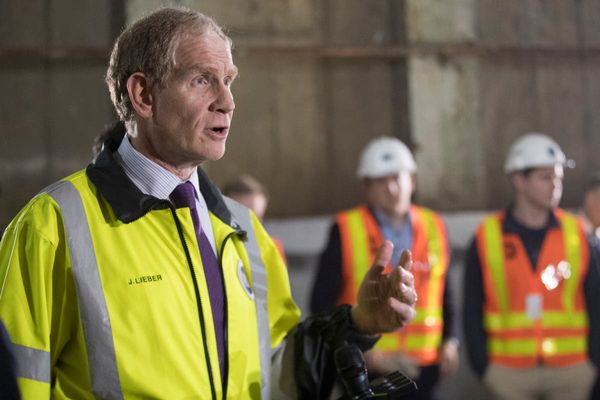
It’s a long distance and a far cry from his ancestral country, Kalkadoon, in the Mount Isa region of Queensland, but Sydney’s Paddington has a different kind of resonance for Kalkadunga man William Barton. It’s here that the composer and multi-instrumentalist, best known for his virtuoso didgeridoo playing, began what he calls “a significant chapter” in his musical life, with the late, great Australian composer Peter Sculthorpe, who was an early champion of Barton, composing work for the young prodigy.
On the muggy late-January afternoon that I meet Barton, we walk down Holdsworth Street towards the Georgian cottage where Sculthorpe lived, as he enumerates his many connections with the area. A short walk away is Peggy Glanville-Hicks Composers’ House, named for the Australian composer, where Barton undertook a live-in residency with his partner and longtime collaborator, violinist and vocalist Véronique Serret, during Sydney’s Covid lockdowns. It was here that he started work on Of the Earth, commissioned by the Sydney Symphony Orchestra for the reopening of the refurbished Sydney Opera House Concert Hall in 2022.


“I’m very proud to utilise the sonic force of the symphony orchestra to reinterpret the Australian landscape; to help facilitate or amplify the songlines that are already here and just as powerful as western European classical composers,” Barton says.
As we walk he points out Pat Thompson Park, named after the mother of actor Jack Thompson, “an old family friend”. “In the process of writing Of the Earth, I would walk past here most days and acknowledge the park.” He often sent Thompson selfies in these moments, and when he reached Sculthorpe’s cottage he would sometimes put his hand over the brass memorial plaque on the footpath outside.
This sense of ceremony infuses Barton’s life. “Ceremony should be every day, whatever that ceremony is for you as an individual – to become stronger in your art form, and in your connection to other humans,” he says. Walking is a big part of it, and he estimates he covers a minimum of 500km each month, with one of his favourite routes taking him from his and Serret’s home in Surry Hills to Centennial Park, where he passes by its massive ponds teaming with aquatic and bird life.
“[It’s about being] at one with nature and breathing the fresh air and putting those thoughts out there and hopefully receiving whatever that might be back, to help shape a compositional piece,” he says.
Walking serves another vital purpose for Barton: he took it up in his late 30s as part of a weight-loss plan that involved working with a personal trainer, giving up alcohol, and daily fasting. He shed roughly 70kg in a few years. “That came through wanting to be the warrior inside,” he says. “I was looking towards the next 40 years of life and thinking about, ‘OK, what do I have to do to live till I’m 80, but also sustain my level of musicality and my travel lifestyle that goes with that? And what do I need to do in order to be grounded?”

It’s this combination of drive and discipline, as much as raw talent, that has fuelled Barton’s meteoric rise through the Australian, and now international, music world. Even taking into account his early start, listening to classical music from his early years and learning didgeridoo from the age of seven from his uncle, Barton has achieved much in his 42 years. He’s played with and composed for major orchestras at home and abroad, released five albums and holds two honorary doctorates.
In recent years he’s received two awards generally given to senior artists for “lifetime achievements” or contributions to music.
Barton performs and tours almost constantly. This year his busy schedule will include the premiere of a new commission for Musica Viva and Brisbane’s Ensemble Q, and an opera about Adam Goodes. He’ll also release his sixth album.
Barton’s day typically begins about 4.30am: “I like to wake up before the sun rises. I drink my water, meditate, and go for a walk,” he says. At some point, he’ll have an ice bath – for “mental clarity” but also to soothe joint inflammation from walking.
He talks about these smaller daily routines as the “5% [of] ceremony” that allows him to get to the “100% ceremony” of performance. “And I’ve got my house set up so that I can just jump on the guitar, play my scales, play the piano – whatever it is, so I can continue to become good,” he adds. “I do that for me, but I also do that for others, so that I have the technique to convey that story [when I perform].”
When we meet, Barton has two January performances front of mind. First, Sydney Symphony Under the Stars, performing with Serret and his mum, Aunty Delmae Barton, a senior Bidjara song woman and lyricist, alongside the Sydney Symphony Orchestra. The other is the Australia Day Live concert on the Sydney Opera House forecourt. Barton is also creative consultant for the event.
“When I do things like the Symphony Under the Stars and Australia Day Live at the Opera House, it’s about ceremony,” he says. “There’s all these things happening around the world that I can’t affect, but I can share my gift that was given to me by my uncles and my mum and dad, going in [to each event] as neutral as possible to create the safe space, and not talk about things but do it with the feeling. That’s how I intention my music.”
Since the death of his uncle, Arthur Peterson, an elder and lore man of the Waanyi, Lardil and Kalkadunga people, who passed on his cultural and musical teachings to Barton, as well as his didgeridoo, he feels an increased sense of responsibility: “It reinforced my path, in terms of the cultural intention,” he tells me.
“My elders have created [a safe space] so that I can be at the Opera House forecourt on the 26th. But I go in there with no political view but [rather] the aim of connection to each Australian in that audience as well as the global audience watching. And so I have to make that ceremony really strong. If I can make that ceremony strong, I can attain the vision that I have of connection – without talking about it.”







